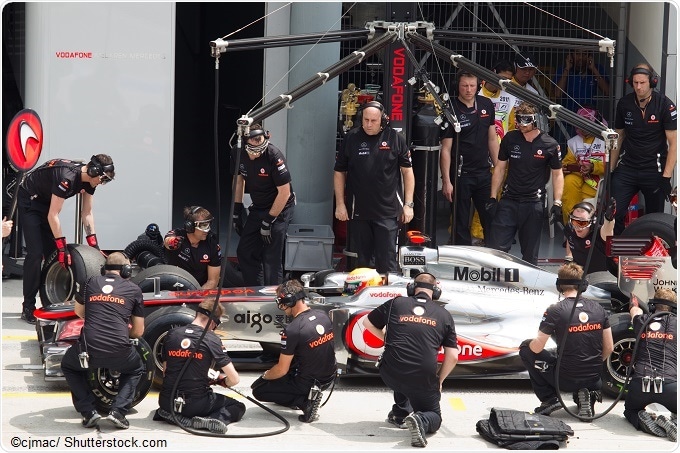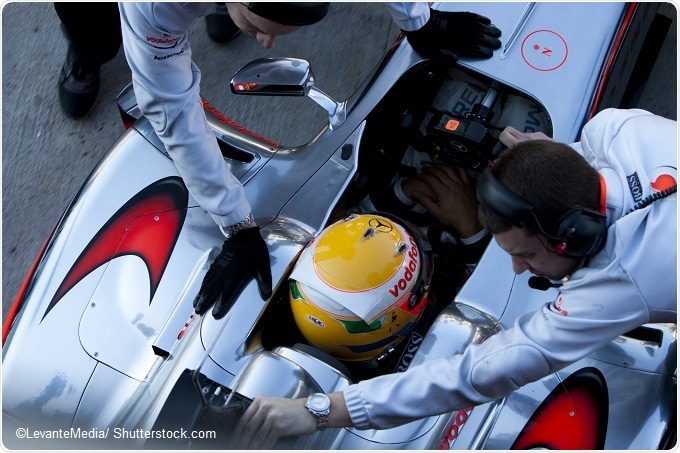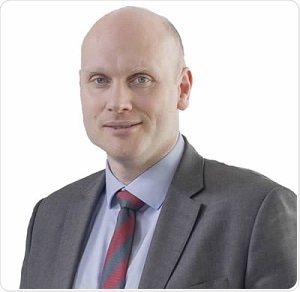We've been in Formula 1 now for 51 years. What defines our ability to compete is the fact that we have understood the need to innovate. In addition, we take an incremental rather than disruptive approach to innovation.
Incremental innovation is not something that many people talk about. Disruptive innovation has received quite a lot of coverage over the last decade but to move the needle in healthcare, continuous improvement is often the best way.

What similarities are there between managing the health and performance of a racing car and monitoring patients?
Over 27 years in McLaren Applied Technologies, we have become experts in developing technological systems - platforms that underpin continuous improvement.
If performance can be defined, we can go about measuring it, and on the back of that measurement, analyze the data to drive a decision.
On the pit lane, or in the paddock, those decisions are made by strategists and engineers to optimize your chance of winning, but, of course, many of the same technology platforms can be applied in healthcare.
If we are able to define what health improvement we're trying to achieve, then we can go about measuring the key performance indicators of that health outcome. We go about analyzing the data and driving decisions; but instead of it being engineers and strategists making decisions, it's doctors, patients and healthcare administrators that act upon our insight in order to ultimately continually improve.
It is a very similar approach to continuous improvement, which is translatable from the motor sport environment into the healthcare environment. This spans across all of our domains of expertise in McLaren Applied Technologies, from automotive to public transport.
Can you please give an overview of telemetrics and explain how it was used to monitor a four-and-a-half-year-old’s recovery from cardiac arrest?
The case you're referring to came from a cohort of patients at Birmingham Children's Hospital, that is being monitored by our system, in conjunction with some other technology for life-threatening events such as the one that you described.
In order to optimize our chance of winning, we deploy sensors, we measure and analyze things and we drive decisions. That's exactly what you would do in an intensive care or a high-dependency care environment caring for children with a heart defect or who have had a heart operation.
Typically, in one of these environments you would measure four sets of vital signs: heart rate, respiratory rate, blood pressure and oxygen saturation. In order to do that continually, a patient typically needs to be in a bed, wired up to a monitor, of course anyone that knows a four-and-a-half-year-old child will tell you that they don't like staying in bed or being wired up to a monitor!
We co-developed a wireless, battery-powered solution to capture these four metrics beyond the hospital bed for example whilst the child goes and plays in the play area.
Secondly, the next innovative step in this situation, is that we applied the same sort of thinking that we apply to making decisions in a Formula 1 race, which is one of running “what-if” scenarios or probabilistic simulations, allowing us to predict when an event is likely to occur.
The reason for this is that if you're monitoring 30 children on a ward, and there are four parameters per child that are changing second by second, it's very difficult for the clinical staff to pick out trends that may be life-threatening or suggest the child is deteriorating in some way, shape, or form, without the support of what we would call a decision support tool.
We developed one of these tools, which alerts the clinical staff to the deterioration of a child before it has become obvious in the environment. Those are two major innovative steps we've deployed that come out of the Formula 1 environment and into the healthcare space in that scenario you have described.

What impact do you think this technology could have on healthcare moving forward?
It's huge. Healthcare is very reactive, over-utilized and there is an acute need to deploy intelligent technologies that can help you derive insight rapidly from the mass of data that you're presented with, not just on one patient, but multiple patients under your care. It's solutions such as this that are the future of our healthcare systems.
How is real-time data from Formula 1 technology also being used to make better surgeons? In what ways will this impact surgical training?
As part of our partnership with Oxford Medical School, we have developed a technology that is again wireless and battery-powered for measuring the movement of your hands and wrists during a surgical procedure.
The hypothesis here, which has been well tried, tested and proven a number of times, is that the less you move, or the poorer your movement, the better the skills that you've acquired.
When learning to play the piano or violin, at Grade One, you make very large hand movements in order to achieve simple musical compositions. However, people who are experts at playing a musical instrument will make very small movements to achieve very complex musical compositions.
It's exactly the same in surgery. The greater your paucity of movement, the greater the skill that you have acquired in performing a particular surgical procedure.
Using these devices, we can now measure someone's level of skill acquisition. We can also benchmark them against those surgeons of an equal amount of training or seniority within their career to understand whether a trainee surgeon is moving up the training curve as they should be, or indeed whether an expert surgeon is performing a task as they have been trained to.

Can you please outline the collaboration between McLaren Applied Technologies, Stowhealth (a GP surgery based in Stowmarket) and academics at University Campus Suffolk to study whether telemetry technology, developed for Formula 1, could be used to tackle obesity? How is this study being funded and what does it hope to achieve?
This is a piece of work that was funded by Simply Health to support prescribed exercise therapy.
Stowhealth is very forward thinking and, as a result, has developed a gym and rehabilitation environment in their clinical space that patients with a Body Mass Index (BMI) that is over a certain threshold can access to lose weight.
However, prescribing exercise and actually carrying out enough exercise to lose weight and bring your BMI down to within a normal range, are two very different things.
When patients are wearing the device that measures their heart rate and the amount of movement they are making, we are able to present each of those patients with an insight into the amount of effort that they put in and the amount of effort that they need to put in to lose weight or the difference between those two.
What are the key benefits of health groups and technology companies working together?
The triple aim of healthcare is to improve health outcomes and reduce health inequality, so that everyone is provided with access to health services, at a cost that we can afford. I think, increasingly, that is not possible if all healthcare interactions are on a one-to-one basis; or human-to-human.
We require technology or digital platforms, to enable expertise to be delivered, not just on a one-to-one basis, which of course will continue to be important, but on a one-to-many basis. Technology companies that develop digital platforms are critical for scaling healthcare services today and, importantly, making healthcare services sustainable into the future.
I think the opportunity that sits in front of us today is the development of technology platforms that support the shift in healthcare from volume-based commissioning (getting a volume discount for the more products that you buy, which is very typical within healthcare systems today), to value-based commissioning.
By that, I mean I'm not really interested in the impact a volume of product might have, but in every single one of those products that I buy having the maximum impact for every one of my patients. I think this shift is critical, again, to make healthcare systems sustainable into the future. We're not going to be able to achieve that without adopting digital platforms such as that that we have, translated from the Formula 1 environment.
Where can readers find more information?
https://www.mclaren.com/racing/
About Dr Adam Hill
 Adam Hill is a dual-qualified Clinician and Mechanical Engineer, with a career built at the interface of Academia, Industry and Health systems. In recent years, he has founded a successful applied research centre, enveloping an R&D programme with expertise in the optimization of novel products and systems, provided strategic advice to global life science companies on behalf of the British Government, and led the medical function in a multinational, publicly-listed Health IT brand.
Adam Hill is a dual-qualified Clinician and Mechanical Engineer, with a career built at the interface of Academia, Industry and Health systems. In recent years, he has founded a successful applied research centre, enveloping an R&D programme with expertise in the optimization of novel products and systems, provided strategic advice to global life science companies on behalf of the British Government, and led the medical function in a multinational, publicly-listed Health IT brand.
Recently appointed as the Chief Medical Officer of McLaren Applied Technologies, Adam is focused on applying the company’s deep technical expertise to developing human-centric, data-driven solutions to challenging problems that inhibit the realisation of high quality health outcomes for all.
Adam graduated from Imperial College London as a Medical Doctor with gold medal; during this time, he also earned a PhD in Engineering and attended Business School. Having subsequently graduated from the Royal Military Academy Sandhurst, he received his postgraduate clinical training from the Royal College of Surgeons of England, and professional engineering qualification from the Institution of Mechanical Engineers while in the British Army.
In addition, Adam has built a portfolio of over 100 publications, in addition to 12 academic awards and patents.